Related Research Articles

Thomas Tenison was an English church leader, Archbishop of Canterbury from 1694 until his death. During his primacy, he crowned two British monarchs.

The Bangorian Controversy was a theological argument within the Church of England in the early 18th century, with strong political overtones. The origins of the controversy lay in the 1716 posthumous publication of George Hickes's Constitution of the Catholic Church, and the Nature and Consequences of Schism. In it, Hickes, as Bishop of Thetford, on behalf of the minority non-juror faction that had broken away from the Church of England after the Glorious Revolution, excommunicated all but the non-juror churchmen. Benjamin Hoadly, the Bishop of Bangor, wrote a reply, Preservative against the Principles and Practices of Non-Jurors; his own Erastian position was sincerely proposed as the only test of truth.
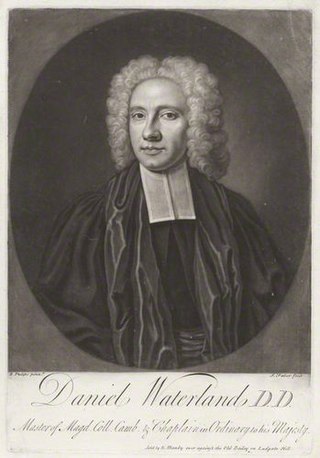
Daniel Cosgrove Waterland was an English theologian. He became Master of Magdalene College, Cambridge in 1714, Chancellor of the Diocese of York in 1722, and Archdeacon of Middlesex in 1730.
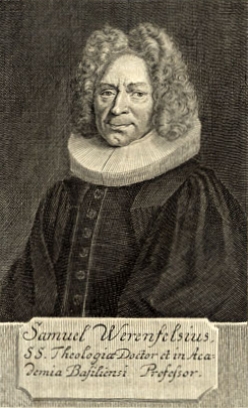
Samuel Werenfels was a Swiss theologian. He was a major figure in the move towards a "reasonable orthodoxy" in Swiss Reformed theology.
Thomas Gordon was a Scottish writer and Commonwealthman. Along with John Trenchard, he published The Independent Whig, which was a weekly periodical. From 1720 to 1723, Trenchard and Gordon wrote a series of 144 essays entitled Cato's Letters, condemning corruption and lack of morality within the British political system and warning against tyranny. The essays were published as Essays on Liberty, Civil and Religious, at first in the London Journal and then in the British Journal. These essays became a cornerstone of the Commonwealth man tradition and were influential in shaping the ideas of the Country Party. His ideas played an important role in shaping republicanism in Britain and especially in the American colonies leading up to the American Revolution. Zuckert argues, "The writers who, more than any others, put together the new synthesis that is the new republicanism were John Trenchard and Thomas Gordon, writing in the early eighteenth century as Cato."

Richard Smallbrooke was an English churchman, Bishop of St David's and then of Lichfield and Coventry.
Arthur Charlett was an Oxford academic and administrator. He was Master of University College, Oxford for thirty years until his death in 1722. He was noted for his love of society, and for his expensive way of living.
Thomas Mangey was an English clergyman and scholar, known for his edition of Philo.
Francis Hare (1671–1740) was an English churchman and classical scholar, bishop of St Asaph from 1727 and bishop of Chichester from 1731.
Arthur Ashley Sykes (1684–1756) was an Anglican religious writer, known as an inveterate controversialist. Sykes was a latitudinarian of the school of Benjamin Hoadly, and a friend and student of Isaac Newton.
Thomas Brett (1667–1743) was an English nonjuring clergyman known as an author.
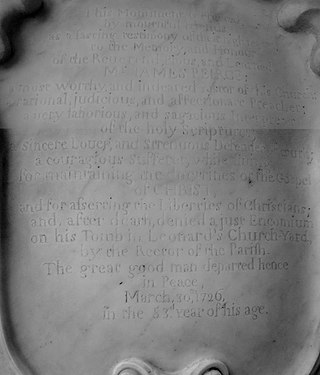
James Peirce (1674?–1726) was an English dissenting minister, the catalyst for the Salter's Hall controversy.
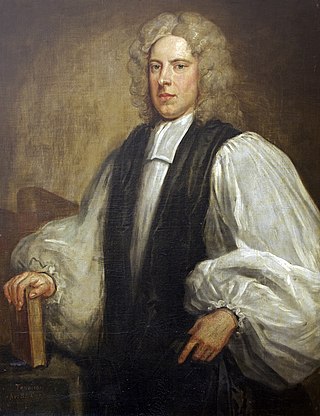
Edward Tenison (1673–1735) was an English bishop of Ossory. An example of the workings of the system of patronage in the Church of England, Tenison also was a significant Whig and controversialist.
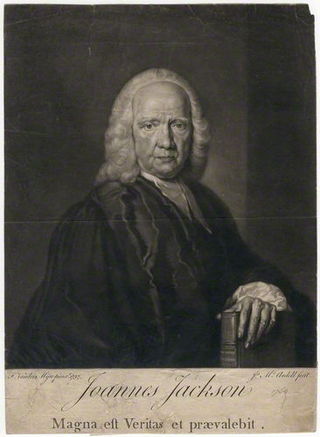
John Jackson (1686–1763) was an English clergyman, known as a controversial theological writer.
John Rogers (1679–1729) was an English clergyman.

Andrew Snape (1675–1742) was an English cleric, academic and headmaster, provost of King's College, Cambridge from 1719.
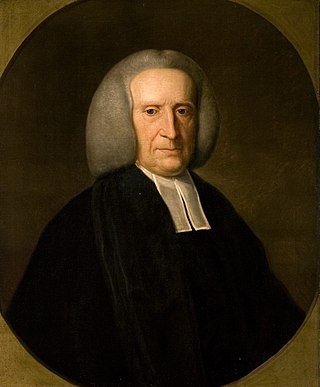
William Richardson (1698–1775) was an English academic and antiquary, Master of Emmanuel College, Cambridge from 1736.

Thomas Sharp (1693–1758) was an English churchman, known as a biographer and theological writer, archdeacon of Northumberland from 1723.

James Hog was a Scottish Presbyterian minister at Carnock, known for his role in the Marrow Controversy within the Church of Scotland.
References
- ↑ "Herne, Thomas (HN711T)". A Cambridge Alumni Database. University of Cambridge.
- . Dictionary of National Biography . London: Smith, Elder & Co. 1885–1900.
- Attribution
![]() This article incorporates text from a publication now in the public domain : "Herne, Thomas". Dictionary of National Biography . London: Smith, Elder & Co. 1885–1900.
This article incorporates text from a publication now in the public domain : "Herne, Thomas". Dictionary of National Biography . London: Smith, Elder & Co. 1885–1900.